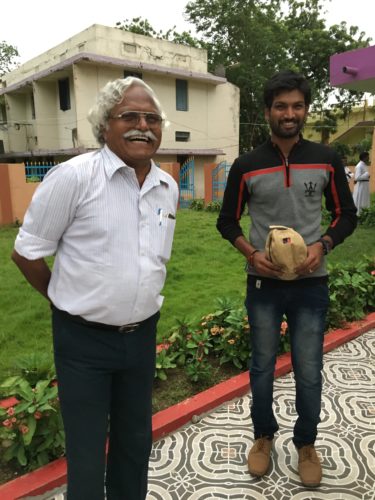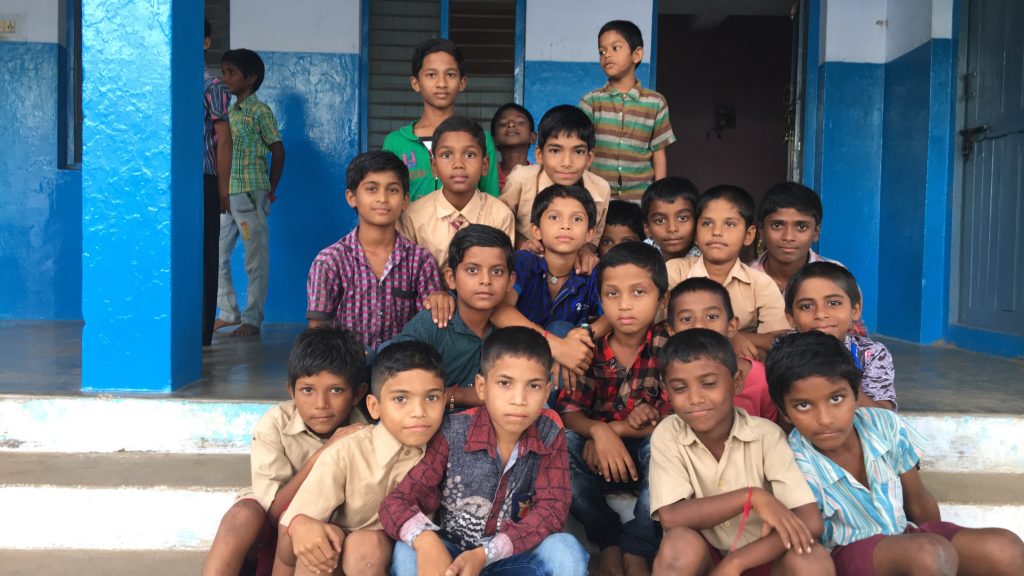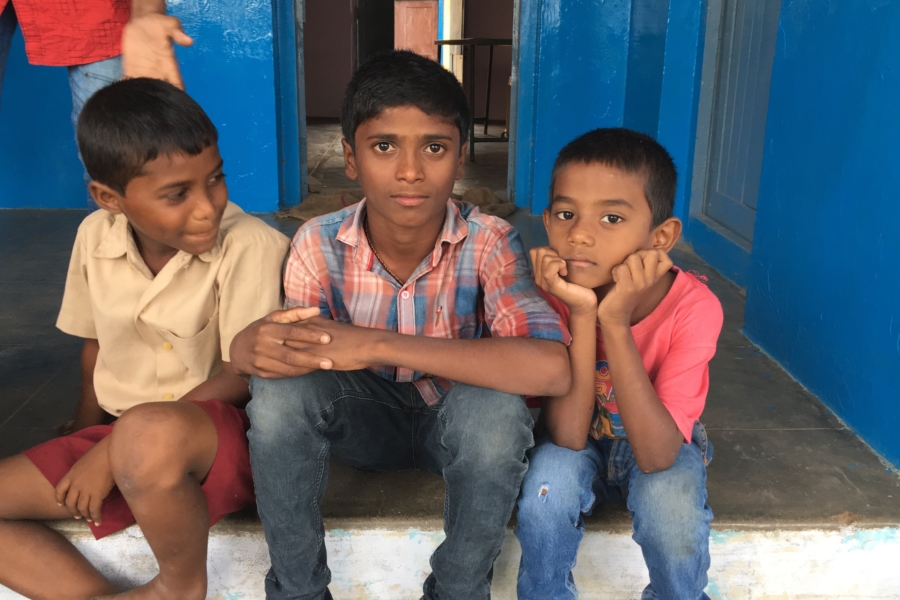Through my work with Children Incorporated, I have become accustomed to not always speaking the same language as our sponsored children. The language barrier doesn’t keep me from doing my job of reporting on the burden of poverty that they face in their lives, however, because what they can’t communicate with me, I can see for myself at their homes, schools, and in their communities. I hear stories from our volunteer coordinators about the kids’ families’ daily struggles. It wasn’t until I traveled to India in August, though, that it occurred to me just how important it can be for children to learn English in school.

Boys at the English Medium School and Hostel are learning English starting at a young age.
On our second day in Dornakal, a small town located in the eastern region of the state of Telangana, Luis Bourdet, our Director of International Programs, and I visited the English Medium School and Hostel. When I first heard the name English Medium, I was curious about it, because I wasn’t exactly sure what it meant. Many of our projects are named after recognizable locations or people; just the day before, for example, we visited the J. Calvitt Clarke Home, named after our founder’s father. I asked Luis about the origins of the English Medium name; he explained that English medium describes a type of education system in which English, rather than a regional language, is the primary medium of instruction.
A language of opportunity
Although English is not the most spoken language in the world (Mandarin comes in at number one, followed by Spanish), it is an official language in a large number of countries, and it is estimated that more than one billion people use English to communicate on a regular basis. It is the most widely-used common language for communication among peoples of differing nationalities. Even beyond conversational usage, fluency in English can be incredibly important because it can lead to more opportunities in life, especially for our sponsored children, who already face a great deal of adversity,
coming from poor families.
Fluency in English can be incredibly important because it can lead to more opportunities in life, especially for our sponsored children, who already face a great deal of adversity, coming from poor families.
The United States is a primary leader in the worlds of technical innovation and economic development, and English is the language most often employed in both of these fields. English is also one of the principal languages featured in the realm of science — and approximately fifty percent of content on the internet is in English. When a child learns English at a young age, he or she may have better job prospects as an adult, which can lead to an increased standard of living. Also, if impoverished parents were given the opportunity to learn English and teach it to their kids, their children would be better equipped to compete in the global workforce, and therefore help break the cycle of poverty.

Mr. Franklin, our Volunteer Coordinator, stands with a former sponsored child near the English Medium Hostel.
I thought about the Indian children enrolled in our program who are not being taught English in school now, and who might not start to learn it until later in life, particularly if they wish to pursue higher education. I considered how that could possibly keep them from being able to successfully compete for employment in the future. Not all schools in India are of the English medium variety because, in part, they are more expensive to run, as salaries are higher for those who speak English, including teachers — which continues the unfortunate cycle of the importance of learning English paired with not enough opportunity to do so.
English medium on the rise
Mr. Franklin, our Volunteer Coordinator at the English Medium Hostel, an energetic middle-aged man with curly white hair, showed us around the home when we arrived. The building itself is two stories high; the boys’ dorm is on the second floor, and the study room and kitchen are on the first. All of the 39 boys that live at the home, who range in age from five to seventeen years, are enrolled in our program, and are benefiting greatly from sponsorship: not only do they have the opportunity to attend school, but also to learn English, which can give them an advantage in life.
When we spoke with Mr. Franklin about the English Medium School that the boys attend, he explained that gaining admission into this academically-challenging school is an achievement; he maintains a strict schedule at the home so that the children have plenty of time to study in both the mornings and afternoons. I asked if he thought that all of the 440 million children in India might ever be able to have the chance to go to English medium schools. He told me that the schools are gaining popularity throughout the country, as urban middle-class Indians who have recognized that English is a global language are sending their children to English medium schools, increasing the demand for them. Additionally, he continued, many families living in poverty are sending their children to English medium schools due to the poor quality of education in government-run schools where only native languages are taught. I am hopeful for all the children in India that this trend will continue so that they all have the knowledge of the language they need to get ahead.
***
HOW DO I SPONSOR A CHILD IN INDIA?
You can sponsor a child in India in one of three ways: call our office at 1-800-538-5381 and speak with one of our staff members; email us at sponsorship@children-inc.org; or go online to our donation portal, create an account, and search for a child in India that is available for sponsorship.



